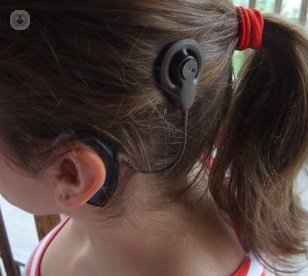5 Key points of cochlear implants
Written by:In Spain there are about two million people with hearing loss or hearing loss. A proper diagnosis is essential to provide the best treatment. In case of deep bilateral deafness or you can specify the placement of a cochlear implant, unlike a hearing aid requires an operation and is indicated only for those patients who do not benefit from a hearing aid deep deafness.
What is a cochlear implant?
 Cochlear implants are compounds electronic devices by an inner portion that is placed under the skin and an outer portion which consists of a coil with a signal processor. This is inside the electrode carrier guide that stimulates the cochlear nerve. The external is responsible for transmitting radio waves to the internal implant.
Cochlear implants are compounds electronic devices by an inner portion that is placed under the skin and an outer portion which consists of a coil with a signal processor. This is inside the electrode carrier guide that stimulates the cochlear nerve. The external is responsible for transmitting radio waves to the internal implant.
What kind of patients is indicated?
Its primary use is in those profoundly deaf people, even congenital, so it is important early detection, to prevent the child, if detected late as deaf not to benefit from an implant, it becomes deaf and go to the world I marked the language. Also it indicated in the post-lingual deaf or those who have acquired language and have lost.
Benefits of cochlear implant
The benefits to the patient, are to obtain sound and feeling someone deaf to hear and identify words and phrases. Furthermore it has been found that advantages in reducing tinnitus, ie, the presence of a continuous beep or buzz.
After implantation care
After surgery, the patient must take care of the surgical wound that is behind the ear. In addition a cochlear implant should be covered to protect it from infections and specialist in otolaryngology will provide antibiotic.
Other recommendations are to avoid bumps in the area and avoid a Nuclear Magnetic Resonance (NMR) carried on the head, without first follow a very strict set of recommendations.
Risk surgery
Implant surgery cochlear implant is a procedure that involves risks, as any intervention. Importantly, the risk of complications are low, nevertheless they can manifest facial paralysis, cerebrospinal fluid, surgical wound infections or extrusion of the implant.
Therefore, the cochlear implant has allowed deaf from birth may also develop oral language and hearing. It has also been a great opportunity for those following infection or trauma suffered deafness, undermining the progress of their language. The latter thanks to these implants have been able to recover.



